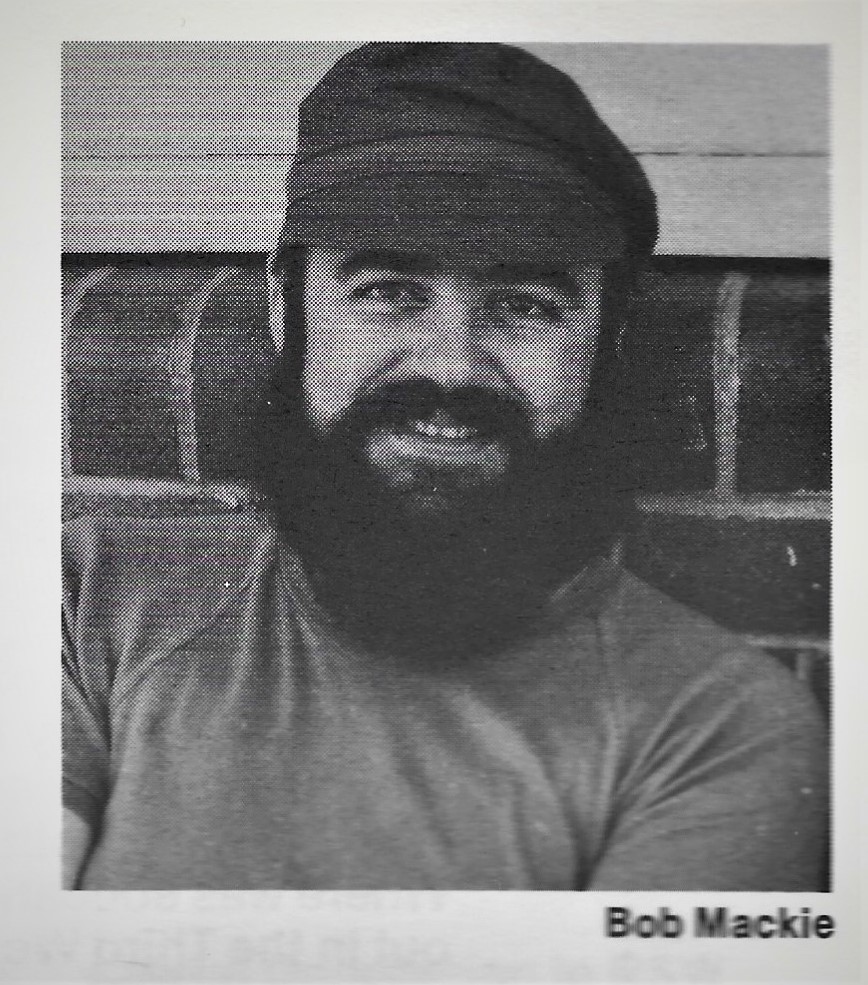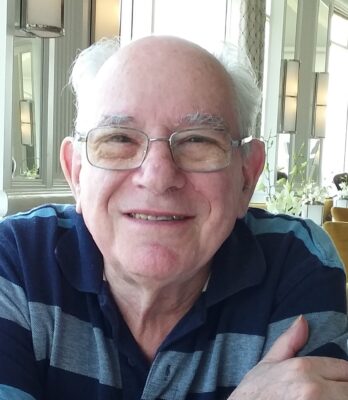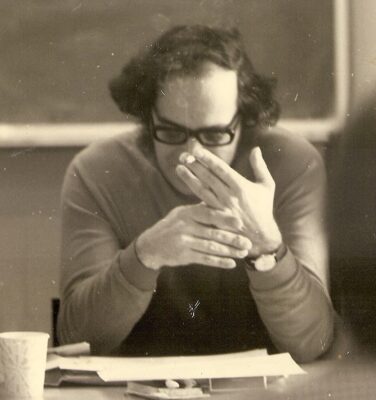If, in the Sydney inner-western suburb of Glebe in the 1970s, you met someone who was wearing a Lenin-type cap and who addressed you with the salutation ‘Greetings, comrade,’ it was highly likely that you had run into Bob Mackie. And if you had, then it was even more likely that you were in for a good old pleasant ‘chin wag,’ as he called it, for Bob loved talking and discussing politics – almost as much as he loved books.
Bob came to PESA literally out of the blue. He did not have a strictly academic background and was not to be found haunting philosophy departments or scratching out honours degrees. Amazingly, he had been amongst us, unknown, for quite some time, as a lecturer at Sydney Teachers College, but in a little known off-campus annex where the College imparted its wisdom to trade teachers in TAFE (Technical and Further Education). And this is exactly where Bob, the Union man, the incredibly knowledgeable autodidact and the most down-to-earth of us all, belonged.
Bob found the Sydney Branch of PESA a little later than most of us who had mainly spilled over from Bill Andersen’s tutelage, and he brought with him not just wisdom but that touch of ‘something extra’ – which ensured that discussions did not get too abstract or too removed from present-day concerns. Like a good Marxist and unionist (why he is not listed among the ‘Australian Marxists’ totally escapes me), he had the great ability to ‘ground’ issues and see them in the context of our ongoing material existence. He had neither a car nor a TV set, and thus he was either out walking among the people, listening to the radio permanently set to the news and current affairs station of the ABC (the national broadcaster) or devouring the latest books. Freed from the practices by which many of us were consumed, such as engaging in Althusser reading groups and tidying up chapters of our doctoral theses, Bob learnt from experience ‘on the ground’ with his TAFE teachers and from less esoteric sources such as current informed political commentary. The result for PESA and philosophy of education, perhaps putting it just a little too simply, was that he saw to it that, for those who would listen, ‘education’ and schooling were not lost in the ‘philosophy,’ and he thus tempered to a significant extent our approach to the philosophy of education.[1] It will come as no surprise that his major book in the discipline was on Paulo Freire (Literacy and Revolution: The Pedagogy of Paulo Freire from Pluto Press), but more of that later.
Bob became not only a central member of PESA but also an energetic organizer of the highly influential 1976 ‘What To Do About Schools’ Conference and a founding Editor of Radical Education Dossier (RED). He worked tirelessly on RED: in an editorial capacity, keeping it grounded and setting its direction and agenda – it was his idea to base each number on contemporary issues; as a contributor, especially with book reviews; and as an organizer, in that he kindly allowed us to fill the spaces in his house that were not taken up with books to store all the copy and in that, as he lived nearest to Glebe Post Office, he handled all the postage and managed the subscriptions.
Bob also contributed to the literature of the philosophy of education in the way that might be expected of him. He did not write or publish necessarily to produce a growing CV for academic advancement, but it seemed rather more to assist his comrades as well as to forward and make public his point of view. When RED was founded, he provided articles, book reviews and acted as the book review editor, and his work can be found broadly represented, especially in the book review section, over the first eight issues. When Access was formed a little later, Bob was there again to provide articles for its early numbers. And, while this was going on, he was quietly working with a small collective on that Freire book.
In the late 1970s, Bob left the Sydney/Glebe scene to take up a post at the University of Newcastle. This, apart from losing the man himself from our everyday lives, also marked a further blow to the already-weakening Sydney Branch of PESA, and it was devastating for RED, as another location had to be found for storing the back numbers and new editions, and a new system had to be put in place for handling the mail and subscriptions. RED suffered badly as this became semi-institutional rather than a labour of love and commitment.
In fact, it was a jolt that RED never fully recovered from, but, on the other hand, it proved to be an unexpected lifeline for PESA. Along with Bill Warren, Bob established the Newcastle and Northern Rivers Branch: I gave the inaugural paper in March 1979 and was delighted to find myself presenting to a room full of new faces that Bob and Bill had brought to the philosophy of education.[2] Thus, as PESA began to struggle in Sydney (and most places), it was becoming invigorated in Newcastle to the extent that the Presidency and Executive flourished there for a time and greatly assisted in keeping the Society going through its darkest days. Bob also continued to attend and contribute to Annual Conferences, especially Townsville in 1982, whether through academic papers or just comradely chinwags: he was a great raconteur.
Newcastle was also good to Bob. It allowed him to have a house of his own that he could fill with books and room to read them; it was much closer to the rich vineyards of the Hunter Valley; and it opened up space for him to write more than book reviews. It is sadly little known that, in that time, Bob wrote a monograph that was, and I am led to believe still is, the definitive biography of Jack Lindsay (Norman’s brother). It was instrumental to his being awarded a prestigious year’s secondment as Head of the Australian Studies Centre at the University of London (1984).
But it was Bob’s earlier book on Freire that brought him most fame – of a sort. Given that it had the word ‘revolution’ in the title and came out in Pluto’s ‘Marxism and Radical Social Thought’ series, Australian Customs, which did judge a book by its cover and a magazine by its centre-fold, impounded the first shipment and placed the book on the ‘Banned Publications’ list along with Portnoy’s Complaint and Playboy magazine. I recall a group of us going to Customs House and arguing the case that the book was not a call to rain fire and brimstone, nor havoc and devastation upon our country and, to the benefit of all, it was finally considered safe for it to be released.[3]
Time passes. I have not seen nor heard of Bob for over three decades now, but I hope that somewhere some fortunate people are having their day brightened by a friendly ‘Greetings, comrade,’ followed by a good chin wag over a fine glass of wine – preferably red.
[1] For an excellent example of Bob’s approach, see his ‘Teachers, Classes and the Crisis’ (1984) in Access, 3(1), 28–34. The paper does not quite fit the archetype academic model, yet is erudite and highly ‘intellectual’; it draws on and references a large number of sources, many of which are not from the ‘academic’ canon; it is firmly grounded in a current issue, while examining a broader context; and it is fearlessly critical of contemporary work – such as mine.
[2] I made a second presentation in 1982: the Branch was still thriving.
[3] This is what Australian democracy looked like at the time, having recently sent young men chosen by lottery to fight in Vietnam, and having also recently broadly accepted the action of the Queen’s representative dismissing its democratically elected Prime Minister. This might help explain why many of us became so committed to a radical overthrow of the status quo in universities, education and society as a whole.




